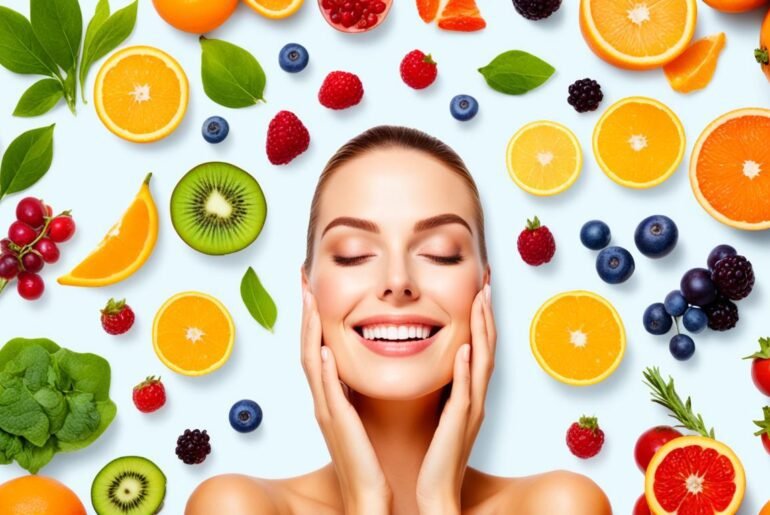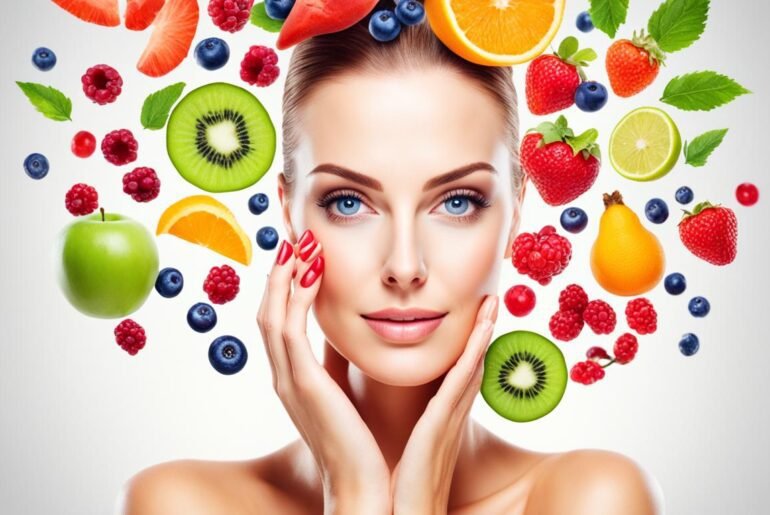Did you know that the skin is constantly under attack by free radicals that accelerate aging and damage cells? The good news is that there is a powerful weapon in nature’s arsenal that can help combat these harmful effects – topical antioxidants.
Whether extracted from fruits, vegetables, or formulated into skincare products, topical antioxidants have become a buzzword in the beauty industry for their ability to rejuvenate and protect the skin. But what exactly are the benefits of these antioxidants, and how do you choose the best ones for your skin? Let’s delve deeper into the world of topical antioxidants and unlock their potential for radiant and healthy skin.
Key Takeaways:
- Topical antioxidants play a crucial role in protecting the skin from free radicals and preventing premature aging.
- Natural antioxidants found in fruits, vegetables, and botanical extracts provide effective skincare benefits.
- Choosing the right topical antioxidants depends on your skin type and specific concerns.
- Topical antioxidants offer a range of benefits, including improved hydration, reduced wrinkles, and pigmentation, and enhanced healing.
- Incorporating antioxidant-rich foods into your diet complements topical antioxidants for overall skin health.
The Science Behind Antioxidants and Their Interaction with the Skin
Antioxidants play a crucial role in maintaining skin health. They are powerful substances that can counteract free radicals and oxidative stress, which can lead to aging and various skin diseases.
Our skin is constantly exposed to oxidative stress from metabolic activities and environmental sources such as pollution and UV radiation from the sun. This exposure can cause the production of free radicals, unstable atoms that can damage cells and contribute to skin aging.
However, antioxidants have been shown to protect the skin from the harmful effects of these free radicals. They neutralize the free radicals, preventing or reducing the damage they can cause. This helps maintain the overall health and appearance of the skin.
But how exactly do antioxidants interact with the skin to provide these benefits?
First, antioxidants can help reduce DNA damage. Free radicals can cause damage to the DNA in our skin cells, leading to mutations and cell dysfunction. By neutralizing the free radicals, antioxidants help prevent or minimize this damage, contributing to healthier skin.
Second, antioxidants improve hydration. Oxidative stress can impair the skin’s ability to retain moisture, leading to dryness and dullness. Antioxidants help restore the skin’s natural moisture barrier, promoting hydration and a more youthful appearance.
Furthermore, antioxidants stimulate collagen and elastin production. Collagen and elastin are important proteins that maintain the skin’s firmness and elasticity. Free radicals can break down these proteins, leading to sagging and wrinkles. Antioxidants help protect collagen and elastin from oxidative stress, supporting their production and maintaining the skin’s youthful structure.
Reducing wrinkles and pigmentation is another benefit of antioxidants. By preventing or reducing oxidative stress, antioxidants can fight against the signs of aging, such as fine lines, wrinkles, and dark spots. This can result in a smoother, more even-toned complexion.
To visualize the interaction between antioxidants and the skin, consider the following:
“Antioxidants are like the body’s own superheroes, swooping in to neutralize free radicals and protect the skin from harm.”
By incorporating antioxidants into our skincare routine, whether through topical products or a diet rich in antioxidant-rich foods, we can harness their powerful benefits for our skin. Understanding the science behind antioxidants and their role in skin health helps us appreciate their importance and make informed choices for our skincare regimen.
| Benefit | Description |
|---|---|
| Protection against UV radiation | Antioxidants help shield the skin from the damaging effects of UV radiation, reducing the risk of sunburn, DNA damage, and premature aging. |
| Reduction of wrinkles and pigmentation | Antioxidants combat oxidative stress, minimizing the appearance of wrinkles, fine lines, and dark spots, resulting in a smoother and more youthful complexion. |
| Improved hydration | By restoring the skin’s natural moisture barrier, antioxidants help keep the skin hydrated, plump, and supple. |
| Stimulation of collagen and elastin production | Antioxidants support the synthesis of collagen and elastin, essential proteins that maintain the skin’s firmness and elasticity. |
| Reduction of inflammation | Antioxidants possess anti-inflammatory properties, helping calm and soothe the skin, minimizing redness and irritation. |
Types of Antioxidants for Skin Health

When it comes to skin health, incorporating antioxidants into your skincare routine is essential. Antioxidants help protect your skin from free radicals and oxidative stress, which can lead to premature aging and other skin concerns. There are various types of antioxidants that offer unique benefits for your skin. Let’s explore some of the key antioxidants:
Vitamins A, C, and E
Vitamins A, C, and E are powerhouse antioxidants that play a vital role in maintaining skin health. Vitamin A helps promote healthy cell turnover and collagen production, while vitamin C brightens the skin and supports collagen synthesis. Vitamin E protects the skin from damage caused by free radicals and helps maintain moisture levels.
Selenium and Zinc
Selenium and zinc are trace minerals that act as antioxidants, protecting the skin from oxidative stress. Selenium helps minimize the risk of sun damage, while zinc aids in wound healing and reducing inflammation.
Carotenoids and Flavonoids
Carotenoids, such as beta-carotene and lycopene, give fruits and vegetables their vibrant colors and offer antioxidant protection to the skin. Flavonoids, found in berries and citrus fruits, possess anti-inflammatory properties and help enhance the overall health of the skin.
Glutathione
Glutathione is a powerful antioxidant that helps protect the skin from environmental damage and promotes a brighter, more even complexion.
Understanding the different types of antioxidants can help you choose skincare products that target your specific skin concerns. By incorporating vitamins A, C, and E, selenium, zinc, carotenoids, flavonoids, and glutathione into your skincare routine, you can enjoy the numerous benefits of antioxidants for your skin’s health and vitality.
The Benefits of Topical Antioxidants for Skin
Topical antioxidants offer a wide range of benefits to the skin. Incorporating these antioxidants into your skincare routine can enhance your skin’s health and combat various signs of aging and skin concerns.
- Reduces DNA damage: Topical antioxidants help in reducing DNA damage caused by UV light exposure, protecting your skin from long-term harm.
- Improves hydration: Antioxidants assist in improving skin hydration, making it appear plump and dewy.
- Stimulates collagen and elastin production: They promote collagen and elastin production, key proteins responsible for maintaining skin elasticity and firmness.
- Reduces wrinkles and pigmentation: The regular application of topical antioxidants can help reduce the appearance of wrinkles and pigmentation, giving you a more youthful complexion.
- Supports healing processes: Antioxidants aid in supporting the healing processes of the skin, promoting faster recovery from injuries or blemishes.
- Reduces inflammation: They have anti-inflammatory properties that alleviate skin inflammation and redness caused by various factors.
- Softens the skin: Topical antioxidants contribute to softening the skin, making it smooth and supple to the touch.
By incorporating topical antioxidants into your skincare routine, you can enjoy the benefits of DNA damage reduction, improved hydration, collagen and elastin production, wrinkle and pigmentation reduction, healing support, inflammation reduction, and skin softening.
Remember, it’s crucial to choose high-quality skincare products with effective antioxidants to ensure maximum benefit for your skin.
The Role of Antioxidants in Skin Conditions

Antioxidants have shown promising potential in preventing and managing various skin conditions. Studies indicate that patients with skin diseases such as vitiligo, atopic dermatitis, and acne often have lower levels of vitamin E, suggesting a potential role for antioxidants in improving these conditions. Incorporating antioxidants into your skincare routine can contribute to overall skin health and potentially aid in the management of these skin diseases.
Although further research is needed to fully understand the effectiveness of antioxidants in treating specific skin conditions, their ability to combat oxidative stress and protect the skin from damage makes them an important component in skincare. Oxidative stress, caused by an imbalance between free radicals and antioxidants, plays a significant role in the development of many skin diseases.
Understanding Oxidative Stress and its Impact on Skin Health
Oxidative stress occurs when there is an excess production of free radicals, which are highly reactive molecules that can damage cells, proteins, and DNA. This oxidative damage contributes to the development and progression of numerous skin diseases, including vitiligo, atopic dermatitis, and acne.
Vitamin E, a potent antioxidant, has been extensively studied for its protective effects against oxidative stress. It is believed to neutralize free radicals and prevent oxidative damage to the skin. By incorporating vitamin E-rich foods, such as nuts, seeds, and leafy greens, into your diet or using vitamin E skincare products, you may help combat some of the underlying causes of these skin conditions.
Exploring the Potential Benefits of Antioxidants for Specific Skin Conditions
While the potential benefits of antioxidants in managing skin conditions are still being explored, research suggests that these powerful compounds may have positive effects.
- Vitiligo: Vitiligo is a skin condition characterized by the loss of skin color. Oxidative stress has been implicated in the pathogenesis of vitiligo, and antioxidants like vitamin E may help reduce this oxidative stress, potentially improving the condition.
- Atopic Dermatitis: Atopic dermatitis, also known as eczema, is a chronic inflammatory skin condition. Antioxidants, particularly those with anti-inflammatory properties, may help reduce skin inflammation and alleviate symptoms associated with atopic dermatitis.
- Acne: Acne is a common skin condition characterized by the formation of pimples, blackheads, and whiteheads. Oxidative stress and inflammation play a role in acne development. Antioxidants may help target these underlying mechanisms and contribute to the management of acne.
While antioxidants hold promise in managing skin conditions, it is important to consult with a dermatologist for personalized advice and treatment options. The effectiveness of antioxidants may vary depending on the individual and the severity of their condition.
| Skin Condition | Potential Role of Antioxidants |
|---|---|
| Vitiligo | Antioxidants like vitamin E may help reduce oxidative stress and potentially improve the condition. |
| Atopic Dermatitis | Antioxidants with anti-inflammatory properties may help reduce skin inflammation and alleviate symptoms of atopic dermatitis. |
| Acne | Antioxidants may help target oxidative stress and inflammation to manage acne. |
Choosing the Right Topical Antioxidants for Your Skin
When it comes to selecting topical antioxidants for your skin, there are several factors to consider. One of the most important aspects is understanding your skin type. Different skin types have different needs and sensitivities, so choosing the right antioxidants can help address specific concerns effectively.
Sunscreen: Another crucial consideration is protecting your skin from harmful UV rays. Applying sunscreen with an SPF of 30 or higher is essential to shield your skin from the damaging effects of the sun.
Retinoids, such as retinol, are highly effective in combating fine lines and acne. However, it’s important to note that these ingredients may cause dryness and sensitivity in some individuals. If you experience any adverse reactions, it’s recommended to consult a dermatologist for guidance.
Pregnancy and hormonal acne: If you are pregnant, it’s crucial to avoid retinoids altogether. While they have proven benefits for skin health, they are not considered safe for use during pregnancy. Additionally, individuals with hormonal acne should consult a dermatologist to determine the best course of action and appropriate topical antioxidants.
Being aware of your skin type, potential allergic reactions, and specific skin concerns will help you select the most suitable topical antioxidants for optimal results.
| Skin Type | Recommended Topical Antioxidants |
|---|---|
| Dry Skin | Antioxidants with hydrating properties like vitamin E, hyaluronic acid |
| Oily/Combination Skin | Oil-free antioxidants like vitamin C, niacinamide |
| Sensitive Skin | Gentle antioxidants like green tea, chamomile |
| Acne-Prone Skin | Antioxidants with anti-inflammatory properties like tea tree oil, zinc |
Remember, each skin type has unique needs, so it’s recommended to experiment with different antioxidant products to find the ones that work best for you. If you have any concerns or questions, don’t hesitate to consult a skincare professional or dermatologist.
The Effectiveness and Drawbacks of Antioxidant Skincare Products

Antioxidant skincare products have gained significant popularity in recent years, thanks to their potential benefits for the skin. These products are formulated with antioxidants that are known for their ability to protect against free radicals and oxidative stress, which can cause premature aging and skin damage.
However, it’s essential to understand that the effectiveness of antioxidant skincare products can vary depending on several factors, including their formulation and the skin’s ability to absorb the antioxidants. Not all antioxidants are created equal, and their effectiveness can be influenced by the product’s formulation and delivery system.
When it comes to absorption, not all antioxidants penetrate the skin effectively. The size and structure of the antioxidant molecules can affect their ability to penetrate the skin barrier and reach the deeper layers where they can exert their protective effects. Additionally, the presence of other ingredients in the product can also impact absorption.
Another critical factor to consider is the degradation of antioxidants. Antioxidants can easily degrade when exposed to light, air, and temperature swings. This degradation can render the antioxidants less effective or even inactive, reducing the overall benefits of the product.
Ongoing research is being conducted to optimize the delivery of antioxidants to the skin and improve their stability in skincare products. Scientists and skincare formulators are exploring innovative formulations and packaging systems that can better protect antioxidants from degradation and enhance their absorption into the skin.
| Effectiveness of Antioxidant Skincare Products | Drawbacks of Antioxidant Skincare Products |
|---|---|
| 1. Provides protection against free radicals and oxidative stress | 1. Variation in effectiveness due to formulation and skin absorption |
| 2. Helps reduce signs of aging, such as wrinkles and fine lines | 2. Some antioxidants may not effectively penetrate the skin barrier |
| 3. Enhances overall skin health and radiance | 3. Antioxidant degradation when exposed to light, air, and temperature swings |
| 4. Can contribute to the prevention of sun damage | 4. Continuous research needed to optimize antioxidant delivery and stability |
It’s important to note that while antioxidant skincare products can provide significant benefits for the skin, they should be used in conjunction with a comprehensive skincare routine that includes other essential steps like cleansing, moisturizing, and sun protection.
Image:
The Role of Antioxidants in Diet for Skin Health

Antioxidants are not only valuable in skincare products but also in the diet for skin health. Consuming antioxidant-rich foods is essential to provide the necessary nutrients for maintaining healthy skin. Incorporating a variety of fruits, vegetables, beverages like green tea and red wine, and botanical extracts into your diet can significantly contribute to overall skin health and appearance.
One of the key antioxidant groups found in food sources is vitamins, such as niacinamide, and minerals, including selenium and zinc. These nutrients have been shown to have skin benefits, promoting a healthy complexion and protecting against damage caused by free radicals.
To emphasize the importance of an antioxidant-rich diet, here is a breakdown of some key antioxidants and their food sources:
| Antioxidant | Food Sources |
|---|---|
| Niacinamide | Fish, meat, poultry, legumes |
| Resveratrol | Red grapes, red wine, berries |
| Curcumin | Turmeric, curry |
By incorporating these antioxidant-rich foods into your diet, you can provide your skin with the necessary building blocks for optimal health.
Additionally, it is important to note that a balanced diet rich in antioxidants can also support overall health and well-being, beyond just the appearance of the skin.
Remember, maintaining healthy skin goes beyond skincare products alone. A holistic approach that includes a nutritious diet is key to achieving and maintaining vibrant, youthful-looking skin.
Conclusion
In conclusion, incorporating topical antioxidants into your skincare routine can have significant benefits for overall skin health. These powerful substances play a crucial role in protecting the skin against free radicals and oxidative stress, which can lead to premature aging and other skin concerns.
By regularly using skincare products containing antioxidants, you can experience cumulative benefits over time. These include protection against UV damage, reduced inflammation, improved hydration, and overall skin rejuvenation.
However, it’s important to remember that skincare is not solely about external treatments. Maintaining optimal skin health also involves adopting a balanced diet rich in antioxidant-packed foods. By emphasizing a well-rounded lifestyle and prioritizing sun protection, you can enhance the effectiveness of your skincare routine and promote long-term skin health.
FAQ
What are the benefits of topical antioxidants for skin health?
Topical antioxidants provide a range of benefits for the skin, including protection against UV damage, hydration improvement, collagen and elastin production stimulation, reduction of wrinkles and pigmentation, support for healing processes, inflammation reduction, and skin softening.
What types of antioxidants are beneficial for skin health?
Various antioxidants are beneficial for skin health, including vitamins A, C, and E, selenium, zinc, carotenoids, flavonoids, and glutathione. Each antioxidant has its own unique properties and benefits for the skin.
Can topical antioxidants help with skin conditions?
Antioxidants have shown potential in preventing and managing various skin conditions. While further research is needed, studies suggest that antioxidants, such as vitamin E, may play a role in improving conditions like vitiligo, atopic dermatitis, and acne.
How do you choose the right topical antioxidants for your skin?
When selecting topical antioxidants, consider your skin type and potential allergies. Additionally, ensure you wear sunscreen with SPF 30 or higher for added protection. Retinoids, such as retinol, can be effective for fine lines and acne but may cause dryness and sensitivity in some individuals. Pregnant individuals should avoid retinoids, and those with hormonal acne should consult a dermatologist.
Are antioxidant skincare products effective?
Antioxidant skincare products can be effective, but their effectiveness may vary depending on the formulation and the skin’s ability to absorb the antioxidants. It is important to note that antioxidants can degrade when exposed to light, air, and temperature swings, which can render them less effective. Ongoing research aims to optimize antioxidant delivery and stability in skincare products.
Can antioxidants in diet benefit skin health?
Yes, consuming antioxidant-rich foods such as fruits, vegetables, beverages like green tea and red wine, and botanical extracts can provide essential nutrients for the skin. Antioxidants found in food sources, like niacinamide, resveratrol, and curcumin, have been shown to have skin benefits. A balanced diet with a variety of antioxidant-rich foods can contribute to overall skin health.




